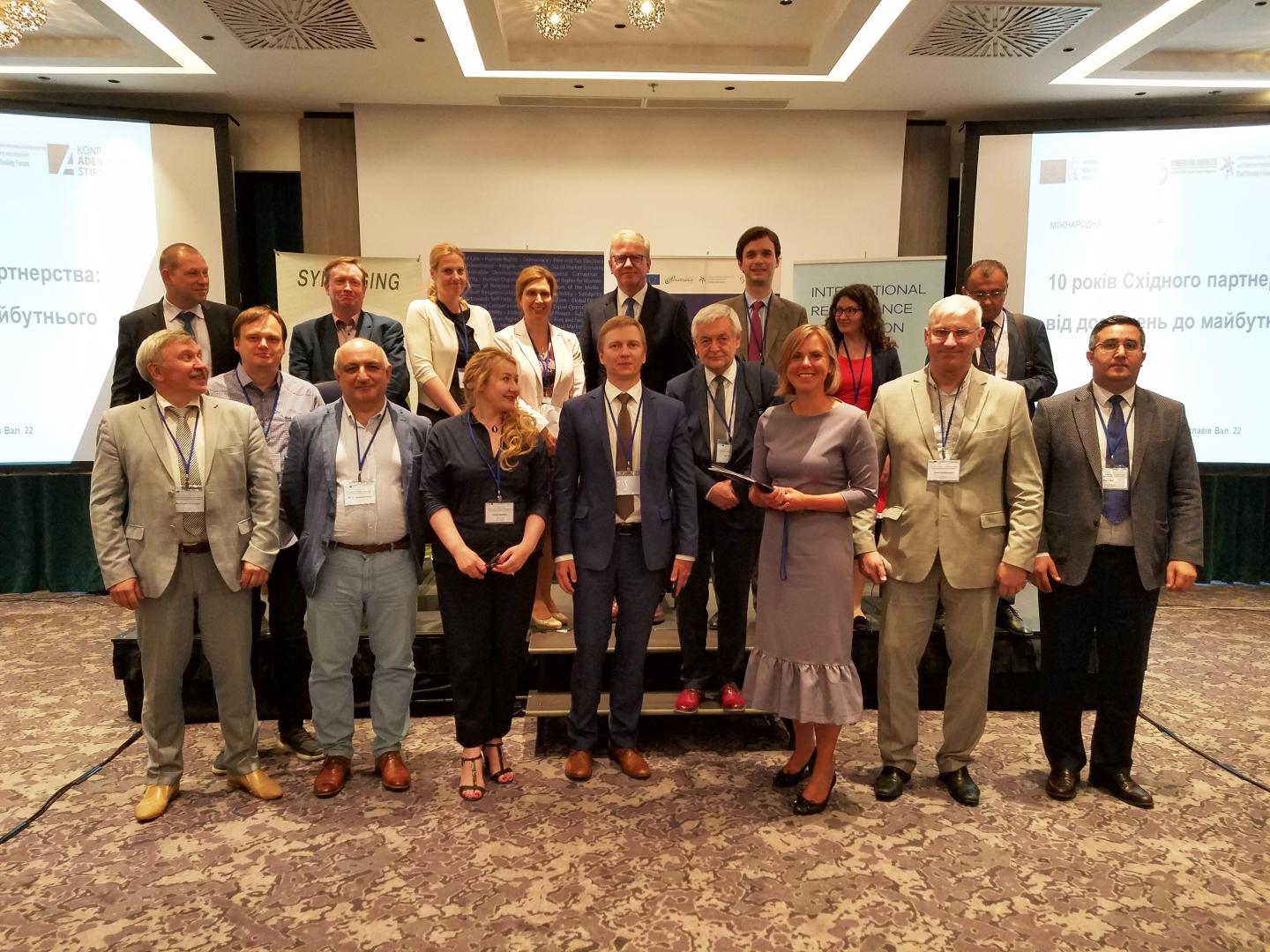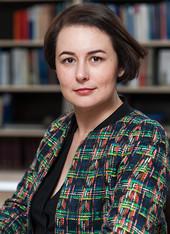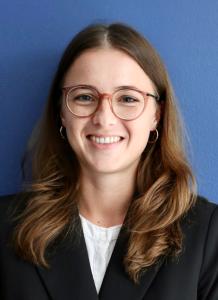МІЖНАРОДНА КОНФЕРЕНЦІЯ "10 РОКІВ СХІДНОГО ПАРТНЕРСТВА: ВІД ДОСЯГНЕНЬ ДО МАЙБУТНЬОГО" - Офіс Фонду в Україні
The conference was opened by Hanna Hopko, Chairman of the Committee on Foreign Affairs of the Verkhovna Rada of Ukraine and Eamonn Prendergast, Political Officer at the EU Delegation to Ukraine, together with the organizers, Gabriele Baumann (Head of the KAS Office in Ukraine, Kyiv), Mykhailo Gonchar (President of the Center for Global Studies "Strategy XXI") and Hennadiy Maksak (National Coordinator of the Ukrainian National Platform of the Eastern Partnership Civil Society Forum).
The opening remarks showed appreciation for the tremendous success and approximation that could be achieved during the ten years of Eastern Partnership. The speakers however emphasized that the program might not have reached its full potential yet and has to be developed and intensified further. Hanna Hopko expressed the need for a clear position and clear signals of the EU and encouraged both Ukraine and the European Union to be more ambitious in regard to the Eastern Partnership. Throughout the conference day, this courage and commitment was central for both assessing past developments and formulating conditions for future advancement.
Panel 1: The 10 years of Eastern Partnership: from its original Idea to the “20 Deliverables”
The first panel was dedicated to the previous development of the Eastern Partnership (EaP) since its inauguration in May 2009. As former Commissioner for Enlargement and European Neighbourhood Policy from 2010 to 2014, Štefan Füle was closely involved and strongly supporting the establishment and design of the EaP. Evaluating the past ten years, the Czech diplomat describes a clear advantage for Ukraine by institutionalizing the European approach in the form of the EaP, which led to a significant bigger progress as it would have been possible on a bilateral track. However, Füle lists a number of mistakes that have been done by the EU in this process, mainly not developing a clear policy towards Russia and not explicitly signaling an enlargement possibility to the countries of the EaP: „How could you offer someone membership without showing the road to get there?“ Even the association agreements showed no clear goal and few people could answer what might come after they are fully implemented or after the Minsk protocol is fulfilled. However, Füle also acknowledged that there are also Ukrainian obstacles, which impede the implementation of the association agreement and further reforms, namely weak democratic institutions and a weak administration with still many hidden Soviet elements. On the conflict, he stressed, that the transformation agenda and the conflict resolution approach should not exist as two separate tracks, but be integrated into one cohesive approach.
Jan Hofmokl, Ambassador at Large and Special Envoy for Eastern Partnership at the Ministry of Foreign Affairs of Poland, draws a positive conclusion on the EaP, emphasizing the ten-year anniversary as a reason to celebrate: “We are not on the Titanic and this is not a funeral”. On the motivation and perspective of the EaP, he states the program was neither about enlargement per se, nor should it preclude any state from joining the EU, rather “mimicking the process of European integration, without naming it.” Hofmokl describes the relationship as a mutually beneficial one, rather than an asymmetrical give-and-take-relationship.
The Member of Parliament and Co-president of the EuroNest Parliamentary Assembly, Borys Tarasiuk, emphasized that the EaP was not set up for the benefit officials, but for improving the everyday reality of people and delivered tangible results, such as visa-free travel to the Schengen-area. For him, EaP is a program about citizens rather than policy per se and should therefore be developed further, bearing in mind the interests of the people.
For the European External Action Service, Javier Fuentes-Leja, Team Leader for the Eastern Partnership, acknowledged both achievements and deficits in the development of EaP countries, emphasizing that the often critized 20 deliverables for 2020 are a way to systemize the current European approach and should not be understood as an exhaustive or conclusive list. On the conflict with Russia, he clarified that the EaP was not intended to serve as a conflict resolution mechanism, but can contribute to overall stability and security in the region. Mr. Fuentes-Leja also lists a number of EU policy areas, that should be extended to the EaP countries, such as connectivity, transport (especially railroad), energy or the harmonization of digital markets. The progress already achieved, however does not outweigh the challenges that still exist regarding the rule of law, civil society or freedom of press and media.
At last, Oleksandr Sushko, the Executive Director of the International Renaissance Foundation, criticized the EaP for its limited impact, especially in Ukraine, where many of the programs’ benefits were already bilaterally negotiated before. Especially as more countries are approaching a complete implementation of the association agreements, further perspectives, or clear signals of the EU are lacking: „We are moving somewhere for decades without having great ideas.“ While this is the case, the attractiveness of the EU is not as high, Sushko went on to say.
The panel was concluded with a presentation by Olga Skrypnyk on Human rights in the Eastern Partnership. Skypnyk works as a Coordinator for the Crimean Human Rights Group, carrying out a Human Rights Monitoring Mission in Crimea, providing evidence to the European Union and international courts. Among the issues mentioned are political prisoners, who are transferred to Russia and detained without access to legal assistance, as well as the practice of automatically imposed Russian citizenship, which limits access of Ukrainian diplomatic personnel to detainees on Russian soil.
Panel 2: Discussing the Status Quo of the Eastern Partnership through the EaP Index: Approximation and Linkage
Turning the perspective from past developments to the status quo, the methodological approach and some key findings of the Eastern Partnership Index were presented and discussed in the second panel. Jeff Lovitt, the Founder and Chair of New Diplomacy and Editor-in-Chief of the index, gave an overview about the structure of the index. Rather than assessing the EaP as a whole, the index differentiates and shows significant improvements in specific sectors for almost all countries. Ukraine, Georgia and Moldova are leading the index, with Armenia on the fourth spot and Belarus and Azerbaijan concluding the ranking.
Veronika Movchan, Scientific Director at the Institute of Economic Research and Political Consultations, added a perspective on the economic performance of the countries, which are all growing, especially in regard to sectoral cooperation and trade flows. For the following years, she proposed a trias of harmonization of standards, transport reforms and full implementation of WTO customs rules.
Afterwards, Wilfried Jilge, an Associate Fellow at Robert Bosch Center for Central and Eastern Europe, Russia, and Central Asia, provided his assessment of the index and its implications. The index proved to be very effective to measure the impact of the DCFTA (Deep and comprehensive Free Trade Agreement) implementations in EaP countries. Jilge however emphasized the importance to also evaluate the EU-measures, not only EaP partners, and raised the question, why only Eastern Partnership countries were compared with each other instead of including EU member states, i.e. Romania and Bulgaria, as well. In regard to conflicts, Mr. Jilge clarified that in his opinion, the EaP is not about geopolitics, but the EU should be aware of the significance its Eastern neighbors are carrying for its own security. For a better understanding of and identification with the program he expressed the need for several visible key projects at the forefront of the EaP that make the program even more tangible and therefore might increase awareness and support.
Panel 3: Eastern Partnership cooperation today - experiences from the EaP countries
In the afternoon, representatives of all EaP countries besides Ukraine, joined the third Panel to elaborate on their experience with and demands towards the project. For Armenia, Boris Navasardyan, President of the Yerevan Press Club, bemoaned that despite its initial momentum in the Eastern Partnership, Armenias progress towards the EU has slowed down considerably in the second half of the ten year period. He traces this back to the officials not being ready to accept such energy out of the civil society. However, together with Moldova and Ukraine, the country focused on implementing the commitments that were entered, instead of just expressing the intention, which in his opinion contributed to the faster development of those respective countries. For the future relationship with the EaP, Navasardyan demanded a clear definition of the role of civil society platforms in the EaP-approach of the EU. For Armenia he envisaged an institutionalized consultative role for civil society, as resources in the political process are limited.
The Georgian perspective was contributed by Lasha Tughushi, director of the Liberal Academy of Tbilisi, who listed a number of current challenges to civil society in his country: Growing polarization, right-wing radical tendencies, xenophobia, and aggression towards liberal media. The lack of a clear European perspective also strengthens the influence of Russia, which spreads anti-Western sentiments among the population. According to Tughushi, democratic forces still hold strong positions and did not capitulate yet, but especially young people are prone to other influences. He therefore strongly emphasized the importance of a membership perspective and the support of civil society in Georgia.
Ihar Rynkevich of the Belarusian National Platform of the Eastern Partnership Civil Society Forum at the beginning of his statement expresses support for a democratic Russia and friendly relations with it. He however clearly states that no circumstances, no integration could be worth depriving Belarus of its independence or limiting its sovereignty. In regard to the EaP he raised the question if it is intended as a serious step of European integration or solely a buffer between the European Union and Russia. Connected with this, he demanded an international consolidated response of all countries involved towards Russian actions and influence.
For Azerbaijan, Ziya Guliyev, a board member at CIVICUS: World Alliance for Citizen Participation, elaborated on his country’s relationship to the EU and EaP. In recent years, the civil society has pressured the government to pursue the implementation of the 20 Deliverables. Within the government however, there is no certain and unified view on the Eastern Partnership, which he, among other factors, traced back to Russian influence.
To conclude the third panel, Sorina Macrinici, Program Director of the Moldovan NGO “Legal Resources Centre”, completed the perspectives from the EaP countries. For Moldova, she described a “travel from excitement to disappointment” over the course of ten years of Eastern Partnership. While people benefitted significantly from the association agreement, there is a significant backlog regarding democratization or the fight against corruption and only modest progress in the judiciary and electoral systems. Macrinici valued the contribution of EU-conditionalities, but expressed the need for political ones instead of just technical requirements. In her opinion, it is important to use the current window of opportunity for change, foremost the depoliticization of institutions. While she describes it as difficult, she also acknowledges the increased awareness of the civil society and the willingness to monitor the changes, in order not to repeat the mistakes of ten years ago. On the side of the EU, Macrinici calls for an increased visibility and impact of its support, especially in regions such as Transnistria or Gagauzia.
Javier Fuentes-Leja used the opportunity of the following Q&A to express the EU institutions’ support for the civil society forums and to recognize their indispensable role for the EU approach to Eastern Partnership. Štefan Füle emphasized the EU and Eastern Partnership as projects of civil societies – not of bureaucrats or politicians.
Panel 4: What is the vision for the future of the Eastern Partnership after 2020?
To conclude the conference, a fourth panel came together for an outlook on the future of Eastern Partnership. The Deputy Minister of Foreign Affairs of Ukraine, Vasyl Bodnar, stated the importance and achievements of EaP as an instrument of approximation, additionally to bilateral contracts. He described the Ukrainian position as neither for or against other countries efforts to move towards the EU, but supports them in cooperating to the extent that is aspired. He listed a broad range of projects that could be included in the EaP in the future – from specific topics, such as roaming charges or electric mobility to broad areas, such as Transport infrastructure or Security and Defence (PESCO). This would allow Ukrainians to not only talk about it, but feel as a part of Europe.
Signe Burgstaller, Ambassador-at-Large at the Department for Eastern Europe and Central Asia of the Swedish Ministry of Foreign Affairs, expressed Sweden’s continued strong commitment to support the development of the six EaP countries. The Eastern Partnership has proven to be a durable and flexible instrument, while constantly adapting to new circumstances. The Ambassador also acknowledged, that the tool has not yet reached its full potential, but added that the further progress depends on the ambitions of the participating countries. She shared the approach of neither aiming at, nor precluding enlargement and stressed the importance of an open-door policy. In her opinion, the EU efforts within the EaP should account for the differences between the participating countries and have tangible results, being visible and meaningful to the people.
The former Ambassador Extraordinary and Plenipotentiary of Poland to Ukraine, Jan Pieklo, stated that the continued existence and success of EaP had to be appreciated: „European Partnership is alive and European Partnership is a success“. However, he pointed to some deficits of the EU-approach, mainly the missing enlargement option and the lack of an approach towards Russia. Especially for Ukraine, which paid “the highest possible price” for European values, deserves an EU membership perspective in his opinion. Pieklo connects the EU’s hesitation in this case to the Russian border, comparing it to the approach towards the Western-Balkan countries. During Q&A, Pieklo added that the EaP failed completely in the area of communication, as its communication policy was incoherent and intransparent and most people were not familiar with the program at all.
Vera Rihachkova Pachta, Advocacy Manager at the Secretariat of the Eastern Partnership Civil Society Forum, presented selected points of a paper, which collected 23 ideas from the perspective of civil society. She suggested extending the partnership on the level of civil society, down to grassroots initiatives, with the rule of law as guiding principle when formulating reforms. The new roadmap should also include clear references to Human Rights and Climate Change, which are lacking in the current version. She also emphasized the importance of clear mechanisms and rules to distribute financial resources among countries and projects after the EU budget reforms with one instrument for all third countries.
Dmytro Shulga, European Program Director of the co-organizing International Renaissance Foundation concluded with a statement on the Ukrainian status quo and demands for future EU interactions. In his opinion, Ukraine suffers from its commitment for Europe that it chose ten years ago and wishes for more understanding and support against Russia. This according to him would not be provided by the EU due to a lack of political will, despite the continued Russian aggression against Ukraine. He named this support the “Deliverable No. 1” for the EU and mentioned stability and good governance as well as economic and social development as further areas, where European support is required. The various signals Ukraine receives from the EU, lead him to conclude, that the “European dream is very vulnerable”.
The organizers and speakers closed the panels and agreed on the conference to have been an important exchange of arguments and perspectives and fruitful discussions.










